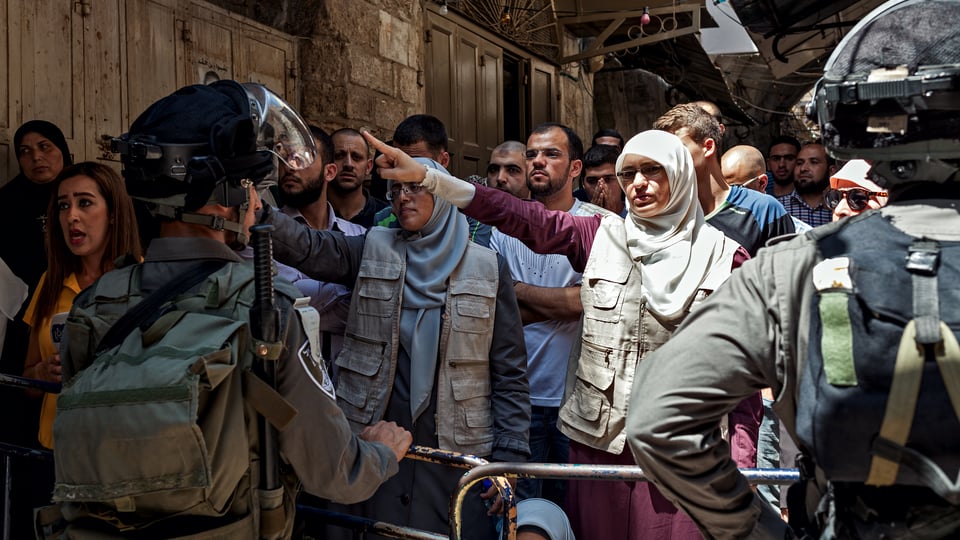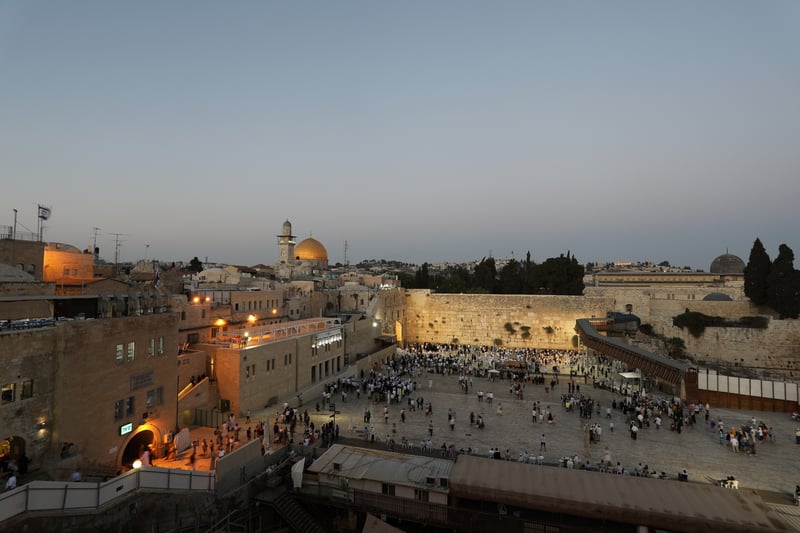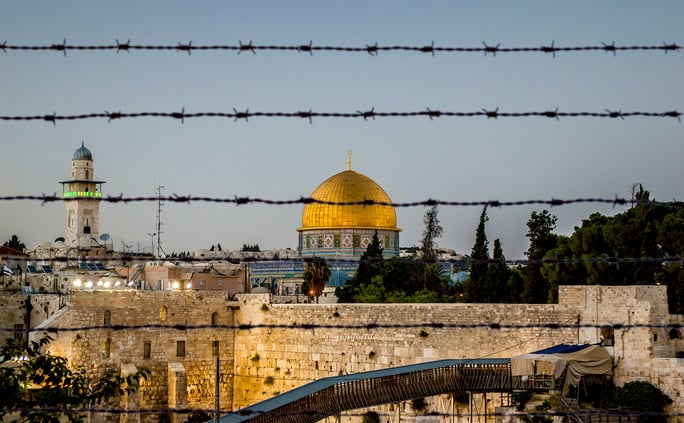Does Jerusalem Belong to Israelis or Palestinians?
The status of Jerusalem continues to be a controversial issue dividing the world. Does it belong to Israelis or Palestinians? Or to Someone else?

On Oct. 7, 2023, the terror group Hamas launched what they termed, “Operation Al-Aqsa Deluge.” Their goal was to rid Palestine and Jerusalem of Jews, who, they believe, occupy the territory illegally. Hamas leader Khaled Mash’al called for the Islamic community to join the holy war in the battle for the Al-Aqsa Mosque.
To understand this, we must understand the importance of the Al-Aqsa Mosque in the Islamic faith. Muhammad founded Islam in the seventh century, setting up Mecca and Medina as the two holiest sites in Islam. Both cities are located in modern-day Saudi Arabia.
After Muhammad’s death in 632, his second successor, Omar bin al-Khattab, conquered Jerusalem and built a mosque on the Temple Mount.
He claimed this Jerusalem mosque to be at the location of Muhammad’s night journey. Hence, it became known as the Al-Aqsa Mosque. Because of this, Jerusalem, and the Temple Mount in particular, became the third holiest site in Islam, behind the holy sites of Mecca and Medina. However, readers should understand that the city of Jerusalem is not mentioned by name in the Koran.
The Jewish claim to Jerusalem
The Jews claim Jerusalem as their capital and the Temple Mount as their most holy place of worship, because it was the location where the first and second temples stood.
Due to the nation’s disobedience, God’s presence left the first temple, and the building was destroyed by the Babylonians (Jeremiah 52:12-13; Ezekiel 9:3; 10:4, 18-19; 11:22-23).
The second temple was constructed under the leadership of Ezra, Haggai, Zechariah and Zerubbabel. However, the Romans destroyed the second temple in A.D. 70.
Today, some Jews seek to build a third temple, which the Palestinians and many Muslims believe will be at the expense of the Al-Aqsa Mosque. Some hardline Jewish Orthodox groups do believe the Al-Aqsa Mosque must be destroyed for the third temple to take its place. In many ways, the Al-Aqsa Mosque is the center of the conflict between Palestinians and Israelis.
(To learn of this conflict’s ancient roots, read “What’s Behind the War Between Israel and Hamas?”)
The Christian claim to Jerusalem
For Christians, Jerusalem is holy because it was the birthplace of Christianity. During the Dark Ages, it was the center of many battles between Muslims and Christians.
Prophecy shows that European forces will once again capture Jerusalem, setting off a series of events leading to Christ’s return.
Jerusalem was first captured by Christians in the First Crusade (1099) under the leadership of Pope Urban II. But Christian control was soon lost to Muslim forces led by Saladin in 1187.
There were nine crusades, but the Christian forces were largely unsuccessful in their fight the Islamic armies to regain control of Jerusalem.
Though Europe today is largely secular, Bible prophecy shows that European forces fighting under a Christian banner will once again capture Jerusalem, setting off a series of events leading to Christ’s return. Christ warned, “But when you see Jerusalem surrounded by armies, then know that its desolation is near” (Luke 21:20).
To learn more, read “What Is the Abomination of Desolation?”
A city of war
With three faiths claiming Jerusalem, it is the most contested city in the world. In recent history, there have been several wars over the city.
At the inception of the modern nation of Israel in 1948, the Arab nations of Lebanon, Syria, Iraq, Jordan and Egypt attacked the fledgling nation, intending to utterly destroy it.
This image shows the three religious sites that are a source of conflict at the Temple Mount: the Dome of the Rock (left), the Western Wall (center) and the Al Aqsa Mosque (right). 
On June 7, 1967, Israeli forces took control of Jerusalem and the Temple Mount during the Six-Day War.
They declared Jerusalem “the eternal and undivided capital of the Jewish State,” but to ease conflict over the Temple Mount, they appointed the Jordanian Ministry of Religious Endowments (“Waqf”) as the custodians of the holy site, which continues to this day. The Waqf does not allow non-Muslims to pray on the Temple Mount, a status that Jews try to contest.
On Oct. 6, 1973, Egypt and Syria launched the Yom Kippur War, a surprise attack on the solemn Day of Atonement (Yom Kippur). They aimed to regain the territory they lost during the 1967 Six-Day War.
Now, 50 years later, almost to the day (Oct. 7, 2023), on the festival of the Eighth Day (Shemini Atzeret), Hamas launched “Operation Al-Aqsa Deluge” to expel Jews from Israel and Jerusalem.
Contention over the Temple Mount
The Temple Mount is constantly a place of tension. Consider the following headlines:
- “Hamas Commander Says Attacks Are in Defense of Al-Aqsa, Claims 5,000 Missiles Fired” (October 2023).
- “Israeli Settlers Storm Al-Aqsa Mosque Complex on Fifth Day of Sukkot” (October 2023).
- “‘The Time Has Come’: Jews Arrested En Route to Temple Mount Sacrifice” (June 2023).
- “The Israelis Set for New Jewish Temple on Al-Aqsa Site” (May 2023).
- “Ben-Gvir Visits Temple Mount: ‘We Are the Owners of Jerusalem and Israel’” (May 2023).
- “Violence Erupts Again at Jerusalem’s Al-Aqsa Mosque” (April 2023).
- “Six Extremist Jews Arrested for Planning Animal Sacrifice Atop Temple Mount” (April 2022).
The Bible calls the city a “very heavy stone for all peoples,” meaning it will be a burdensome problem for all nations that entangle their affairs with the city (Zechariah 12:3). The question remains: Who has the right to call Jerusalem their capital?
To learn more, read “Temple Mount: Its History and Future.”
The rightful owner of Jerusalem
The most popular solution for Jerusalem is known as the two-state solution. A common form of this proposes that Jerusalem be divided and returned to its pre-1967 borders, with West Jerusalem given to Israelis and East Jerusalem given to Palestinians.
Prophecy shows that before Jesus Christ’s return, the nations will be gathered against Jerusalem and the city divided
Then Christ will return to earth and punish the nations responsible for this (Joel 3:2).
But what happens after that will be a remarkable transformation. Jesus Christ will establish His world capital at Jerusalem! This shows that the holy city does not belong to any one nation or religion—but belongs to God Himself.
In Zechariah 2:12 God says He “shall choose Jerusalem again” (King James Version). Notice the following prophecies that show what He has planned for the city:
- People around the world will go to Jerusalem to learn God’s laws (Isaiah 2:3; Micah 4:2).
- Many nations will visit Jerusalem and be considered God’s people (Zechariah 2:11).
- Jesus will rule and judge the nations from Jerusalem (Zechariah 14:9; Isaiah 2:4; Micah 4:3).
- The inhabitants of Jerusalem will live in perfect safety (Zechariah 14:11).
- Spiritual healing will go forth from the city to the rest of the earth (Zechariah 14:8; Ezekiel 47:1-2, 3-4, 5-6, 7-9, 10-12).
The Bible instructs us to “pray for the peace of Jerusalem” (Psalm 122:6). That means the return of Jesus Christ and the establishment of His Kingdom on earth. Only then will it fulfill the meaning of its name:
The City of Peace.
Photo credit:
rglinksy/iStock via Getty Images
Date Posted: October 23, 2023



